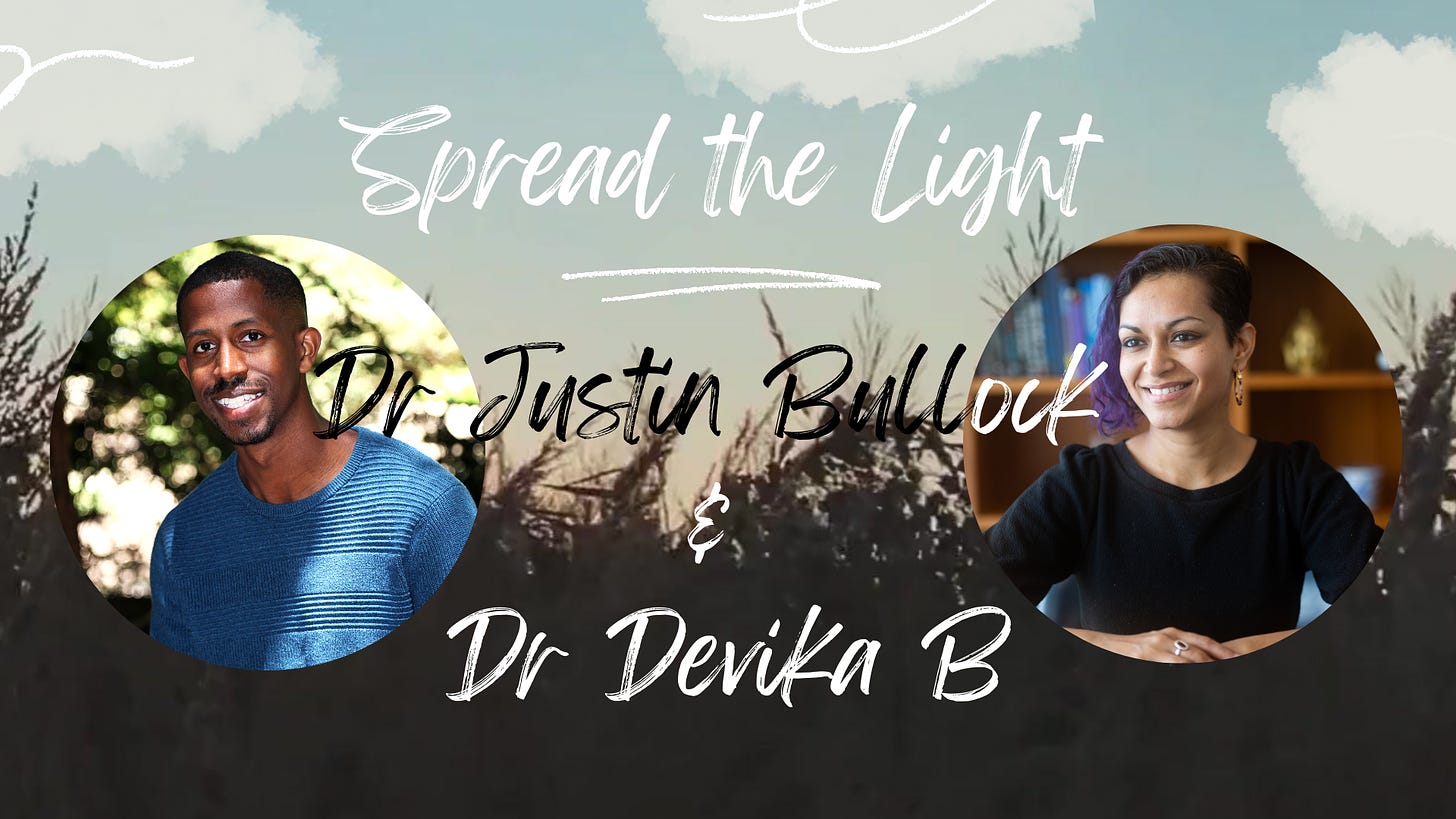Dear community,
In honor of Suicide Prevention Month, I have a very special conversation to share with you — with physician scientist and activist Dr Justin Bullock.
💫 Spread the light with Dr Devika B. First-person accounts of living with mental illness that dispel stigma and stereotypes and instead, spread hope and light — also a YouTube channel and podcast on Apple and Spotify
Because stigma festers in the dark and scatters in the light
This conversation was poignant — covering Justin’s journey from deep stigma to self-acceptance and radical openness around his story; his advice for preserving agency during a psychiatric hospitalization; and his take on physician monitoring programs.
Justin Bullock, MD, MPH, is a fellow in Nephrology at the University of Washington School of Medicine. Dr Bullock is a passionate medical educator and an identity safety researcher. He is outspoken about his lived experience as a gay, Black, bipolar physician. Dr Bullock’s work and story have been featured in the New England Journal of Medicine, Vox, and Forbes, among other places.
Above, you’ll find the audio recording of the podcast episode and below, a transcript. As always, the written conversation has been lightly edited for clarity and length.
If you’d prefer to watch this conversation, click here. Here’s a clip to give you a flavor:
Trigger warning: In this interview, we talk about suicidality, self-harm, depression, hypomania, family violence, imprisonment, and police violence.
Catch other parts of our mini-series on clinician well-being:
Psychiatrist Dr Ahmed Hankir’s journey with melancholia and elation in medicine
Psychiatry resident Dr Jake Goodman’s journey with depression and anxiety in medicine
Read an article on the key issues — Deep dive: Clinician well-being
Click here to catch up on other Spread the light columns, in addition to other posts organized by column type, going back to our newsletter’s launch in January 2023.
If you or a loved one needs help for a mental health crisis, don’t hesitate to call or text 988 — or reach them online here. Find other resources here, search for a US treatment facility here, and find a US-based therapist here.
If you’re a US-based clinician or health student dealing with “any issue, not just a crisis” — reach out to the Physicians Support Line, free of cost and confidentially: 888-409-0141 (M-F, 8 am to 12 am ET).
Wishing you light,
Dr Devika Bhushan
DB: Dr Justin Bullock is a truly bright light. He was actually the brave soul who inspired me to share my story, as I’ve shared here previously. I’m lucky to call him a friend.
Justin, for anybody who doesn’t know you yet, can you share the broad brushstrokes of your mental health journey?
JB: So I would say my journey with mental illness begins with my family because I have a pretty extensive family history of mental illness.
My Dad has bipolar disorder, and he’s actually in prison, really related to his bipolar not being well treated. My grandfather has schizophrenia.
As I was growing up, I thought that mental illness was kind of this thing that people sort of made up — [as] excuses if they got in trouble — like my Dad.
So there was a lot of judgment or stigma within myself, and within my community.
And when I was in high school — I’m gay — I came out to my family, and that didn’t go very well. I actually attempted suicide in the aftermath of all of that.
At that point, I was diagnosed with a mild depression, but really didn’t get any care.
And then in college, I had my first real, long depressive episode, and I started doing therapy. It took me a very long time on this journey until I was ready to take medicine. And eventually I did, and found I got so much better.
Continuing on to medical school, I had actually stopped the antidepressants that I was taking in college under the guidance of my psychiatrist to just see how things went. And I had another episode of depression.
But this time when I took the same meds I’d taken before, I started to get very sped up. And I got to a point where I was only sleeping 90 minutes at a time. I was sort of very angry and impulsive [hypomanic], basically starting to show the signs that I have bipolar disorder.
I have bipolar II — and that is a very tricky diagnosis to make. Because a lot of times [during hypomania], a bipolar person looks like a doctor — who is very productive, really goal-oriented — and then the depressed episodes, we often hide.
Since that time, overall, I’m doing a lot better, but I’ve had a lot of challenges along the way. In total, I’ve attempted suicide three times in my life. Some of them have been very, very serious.
Along the way, I started sharing my story of living with bipolar disorder, and I found that so many people share in some aspect of my lived experience with mental illness, either for themselves directly, for a family member. And in this process of sharing, I try to turn this bipolar, which is often a thing of a lot of suffering, into a gift — something that helps me connect with people.
I think it definitely helped me connect with patients. Now that I’m a fellow in nephrology, even in kidney medicine, the topic of mental illness comes up so much.
DB: You spoke about initially having this a great deal of stigma around bipolar disorder, given your experiences with your father — and then coming to a place where you were comfortable enough with the diagnosis for yourself to be public about your experiences. I’m curious how that journey occurred and what it took to get to that point of comfort with your diagnosis and with yourself.
JB: I very much believe that I need therapy; I need medicine. Those are sort of the baseline fundamentals for me to just be functional — the Justin that I want to be.
Meds turn down the intensity of my symptoms and then therapy’s where I’m able to process and interrogate the traumas and stigma that I have within myself.
And for a long time, I’ve had this history of hurting myself. And one day, my therapist said: ‘Your father, when he gets very angry, he hurts other people — and you, when you get very angry, you hurt yourself.’
That, combined with talking with family and understanding more of my Dad’s experience — helped me to first find compassion for him as a human who’s imperfect in his suffering, but also to see those things reflected in myself. And in the end, I actually feel more connected to him and we have an imperfect relationship…
But forgiving him allows me to forgive myself somehow — or accept myself.
I remember one night in the hospital where I still wasn’t sleeping and I was very highly medicated, but just very sad and suffering.
And there was a nurse who was taking care of me. We’re in this dark room, doors closed. And I remember this thought that flashed through my mind: ‘She couldn’t stop me if I wanted to kill myself. I could kill her if I wanted to.’
I have never had this type of thought before. It caused a lot of distress in the moment because I felt like this monster, this absolutely horrible person.
And part of it was reflecting that I was unwell and my reality was kind of breaking down. I was in so much pain that I was desperate for anything that could make the pain stop. Those moments are not ones that are comfortable to share because they don’t sync with who I know Justin to be.
Really being confronted with moments like those allows me to have more empathy for my father who hurt my Mom, who hurt other people. And it doesn’t take away [from the fact that] I am responsible for my own actions.
And mental illness is real.
DB: That’s so relatable for anyone who has experienced not being themselves in some way. When we look back, we are — sometimes, just like you said — horrified that our brains enabled us to go to a place that we never thought we could go. And it’s a struggle to sync our sense of who we are with that narrative and that moment. That’s one of the hardest things about being unwell in this way.
JB: I completely agree. Even as I think back to the moment now, it still makes me want to cry because I think about how much pain Justin had to be in to experience that thought.
And I feel so lucky because I don’t feel that right now, you know? And of course, I have this fear that maybe that pain is going to come back at some point. But I’m grateful that in this moment, I don’t have it.
DB: And I’m grateful that you’re here. You had so many close calls, and for you to be here with us today, I’m just really grateful for that. You are such an incredible person.
You have so much empathy for Justin in that moment — what would you tell yourself, knowing everything you know about your journey and everything it took to get to this point, then?
JB: I love these questions. I usually do not cry during interviews. I’m grateful for you to make me feel safe to do this.
If I could go back and tell myself something, it would be, ‘Your pain is real.’
There were times I did not believe that things would ever get better. Because I had done everything: I was exercising as much as possible; I was taking my meds; I was doing therapy three times a week. I was trying really hard to be positive and use all these skills that people had taught me, and I was still suffering.
The story that I tell often — really, one of the most meaningful mental health interactions I’ve ever had — was with my sister.
This had been probably after two suicide attempts. My family had really [never before] seen the dark side of my mental illness because I did a really good job of hiding it from them. But then they saw me after.
And most people think after you survive a suicide attempt, it’s this process of happy healing where things just get better.
For me, I was just so unwell that I went into an even darker place than I was before the attempt. First, to me, that was unfathomable. And my family, they saw me hurting. This person — who normally has this bright energy, who’s very positive, happy, like a squirrel — was just very unwell.
My sister, I said to her: ‘I’m really sad that my niece won’t remember me,’ hinting towards suicide.
And she said to me, ‘Do you think that I would let her forget you?’
And every single time that I think about that, I feel so happy and grateful for my sister in that moment, because she was validating my suffering: ‘Justin, I’ve seen you suffer for years. And I don’t fully understand the pain, but I know that you are in this deep, deep pain. And I don’t want you to take on this burden of living for us.’
It was this weird thing where it sounds like it’s promoting suicide, but it completely did the exact opposite.
Because she was saying, ‘Justin, you know that my daughter means everything to me. And you mean everything to me. And I would never let her forget you, even if you hurt yourself, because I will always love you. And my love is not contingent upon you being here. I will love you no matter what.’
There is no textbook that says to do that. And that was the absolute correct thing for me.
DB: That’s so beautiful. She knows you inside and out — and she knew what you needed to hear in that moment. And that was it.
JB: We’ve reflected on it since then. And she’s even said, ‘When I said that in that moment, and I truly meant it, that’s when I knew that I loved you in a different way than I ever understood.’
Because she’s forgiving me in this moment for doing this horrible thing that I have so much guilt about — having even attempted suicide.
I carry so much guilt because I’ve been willing to hurt my family — because I felt weak.
DB: Do you still carry guilt around it?
JB: I definitely still hold some guilt. I’ve done a lot of work to try and help understand it and show myself compassion.
Another story related to this — the second suicide attempt was really the worst one of all of them, by quite a lot. And ultimately, I ended up calling my therapist quite far into the attempt. It was in the middle of the night. He didn’t answer.
But then he called me back, within one or two minutes. And I was unconscious within five minutes of this phone call. And obviously I lived.
But I always felt so much guilt because if he didn’t answer that phone, then he would have had to live the rest of his life with my life on his hands.
And I felt horrible for doing it.
But you know, I think he saw that I was unwell and he really tried to lay the groundwork, like, ‘Justin, I want you to call.’
And I think some people will say that, but then they don’t actually want you to call. That actually is harmful, when someone is unwell.
But we’ve talked about it since then and for him, I gave him this incredible gift — because he had the opportunity to save me.
I’m very confident that had he not called back in that time or had I not called him that I would have died because of the intensity of the attempt.
And he saved me. And that’s this gift.
It’s holding this very complicated thing where the only way that he could save me is if I took a risk with him and knew that there were potentially harmful consequences.
And there are so many people who have lost loved ones who wish they just had the chance to save their loved one.
To me, this is a message both to people suffering and to loved ones of sufferers: I am happy that I made that call. (And it took me a really long time to feel that way, probably years after.)
And for loved ones to tell people, if they mean it — that they want you to reach out to them in times of emergency.
And obviously people need their mental health specialists and experts and medicines and all these things.
But sometimes you need someone who just won’t judge you, who you can just call when you’re in the darkest and scariest of places.
DB: What advice do you have for friends or family members of somebody who is struggling with suicidal thoughts? What are the right ways to show up in those moments?
JB: Psychiatric hospitalizations are extremely hard. You lose all of your agency.
And you know, for me, one day I’m a doctor — I’m ordering meds for people; I’m putting in central lines.
And then, you go into a psych hospital and you don’t get to decide anything about yourself. And that is hard. It’s not fun.
I know that there are times in my life where I need to be in a hospital.
And I think a lot about: how can we make those moments less traumatic? And how can we try to minimize re-inflicting additional trauma?
And one thing that I have started to talk with my partner about nd one thing that I encourage people to do is to talk with someone [who is struggling] and say, ‘You know, we think that you need to be admitted to a hospital. Who would you want to go with you to the hospital?’
There may be some resistance early on, but I think it’s really powerful because you’re saying, ‘We're going with you. We are not abandoning you. We’re not sending you to this place andgetting rid of you. And we want you to have the ability to decide who goes with you.’
So, for instance, for me, I never would want my partner to be the person who sent me to the hospital because it would be really damaging to our relationship.
I would always want him to call one of my mental health providers and for them to make that decision. My old therapist — he took me to the hospital more than once — and I wasn’t always happy with him, but it was always done in a way that I felt some sense of agency, even if I didn’t really have a choice.
He would say, ‘I really, really, really do not want to call 911.’ And part of that is I’m a Black man and he was very conscientious of the implications of any type of potential law enforcement or EMS getting involved — and how that could potentially be lethal for me — which is a whole separate conversation.
But yeah, I think giving people agency [is key].
You know, everyone is on their different journey of how much they accept that they have mental illness, how much they can recognize that they’re unwell.
I think most people know when they’re suffering. Like when you’re depressed, most people know that they’re not happy. And you can anchor on: ‘you’re suffering right now’ — and build off that.
With the bipolar spectrum, when people are sped up, sometimes it’s a little bit harder to recognize. Like, when I’m sped up, I feel good; usually, my life is going pretty well. I’m doing research; I’m publishing papers; I’m getting cool opportunities to talk; I’m having a lot of energy; I’m running a ton; I’m getting in good shape, lifting… all these things. I feel good.
I will say this again and again. I very much believe in the importance of having mental health professionals who you trust. You know, bipolar is a disease where, for some people, and I would say for me, there are times where reality kind of starts to break down a little. And if you don’t have someone that you trust before reality starts breaking down, it’s really, really hard.
If you have bipolar disorder, you need professional help. This is all my opinion, obviously. I fully believe in empowering people — I read a lot of things, I try to implement things that I read, but there are parts of my life that are greater than I’m able to manage on my own.
And having a team of people is, for me, I think that’s the only reason I’m still alive.
DB: It sounds like a lot of it is around making advanced plans for what would happen were you to walk through a really difficult time. It’s hard in those moments to conceptualize of these plans.
Thinking about what it takes for you to stay well — not to be up or down — especially as you’re walking through a super busy professional time: residency, now fellowship, being active in research, having an active social life, doing a lot of speaking events… what are your must-dos to stay well through all of it?
JB: The first is to truly be honest with myself and know that I’m aiming for middle-range band, and I have a cyclical mood condition. So I have times where I go above and below that band. Accepting that allows me to then sort of continually self-reflect and think about, ‘Am I in that band? Am I a little bit sped up? Am I sad?’’
It’s hard because we live life. And good things and bad things happen in life, and they can make us go up and down, just naturally. And so I think most bipolar people would say this — there’s a lot of time we spend self-checking.
There’s times where you’re like, ‘Hmm, I’m not sleeping and I’ve been super focused at work, more than normal, and I’m running a ton.’ So these things have now added up to where I’m probably not just feeling a little bit good. Something’s probably going on.
And usually, I’m the first person to know. I know before my doctors know; I know before my boyfriend knows.
I do really believe so much in the importance of the environment that I’m in — because it shapes my safety to ask for help when I need it.
I’ve been very open about the fact that I had a less than ideal time in residency related to my bipolar, and that was very hard for me because I didn’t feel like I could be truly honest about when I was struggling. And to me that feels dangerous.
You know, I tried very, very hard to make sure that my mental health does not impact my patient care. But when you’re afraid to ask for help, that’s very risky for anyone.
You know, we were just talking about contingency planning. I feel very lucky because I get to be out every day about being bipolar. It’s not something that I hide. And I know that most people don’t have that experience.
When I started fellowship, I sat down with my PD [program director] and I was like, ‘Okay, I had this rough time before. I want to make a plan now before anything happens: If you’re worried about me, this is what you’re going to do. If I’m worried about me, this is what I’m going to do.’
Really having a very, very clear, explicit plan — I think it makes everyone feel safer.
And I fully recognize that I’m in a sort of special position because I felt safe to do that. And I hope we move towards a [culture in] medicine where everyone feels safe to do that.
And then for me, exercise is a very big thing. I’m a big runner. Interestingly, lately that’s meant me being kind to myself when I don’t run. Because I sometimes have made it into this thing where I have to run six days a week. Now I’m 30, you know — my knees hurt sometimes and I need to take some days off.
And then sleep for any bipolar person is the most fundamental thing. Fortunately, my partner is very sleep-sensitive, and so if I don’t sleep enough, then he doesn’t sleep enough, and if he doesn’t sleep enough, then I know about it. So he’s my permanent check.
And then I do therapy. Right now, I’m actually upping to twice a week, because I’m in research time and have time. And I’m actually maybe going to go up to three times a week at some point, just because you can make more progress because you’re spending less time updating and more time kind of therapy-ing for each session.
And then, I take meds every single day. I hate taking medicines. I take lithium and Seroquel and it kind of changes depending on what’s going on. But I have side effects from medicines, and I also know that they are very, very important to me to staying where I am.
DB: Could you give us a little bit more of a flavor of the bureaucratic, very overbearing system to which you returned after your suicide attempt in residency and what that experience looked like?
JB: To lay the context, it was my first year of residency. My suicide attempt actually happened right as COVID was sort of ramping up, but it was unrelated to COVID. And I’d actually been doing very well during my first year of residency. I got this teaching award, and I was doing really well clinically.
And I say that because I thought that as long as I was a good doctor, that it didn’t matter if I was bipolar — that I would be protected because I just did a good job at work.
And I attempted suicide. It happened outside of work. I called 911 myself. And I was hospitalized. I did a month-long treatment program.
And when I tried to come back to work, first, I had to do this very invasive and very traumatic assessment where they drug tested me and made me release all of my psychiatric records. It felt like an interrogation. The goal [was] to uncover all aspects of trauma in my life — like they asked me about being sexually assaulted as a child and all these things that I felt didn’t involve my workplace at all.
And that was traumatic in and of itself, but then after, when there was evidence that I’d done nothing wrong — there was no concerns I’d ever been compromised in any way at work — I still had to sign this very punitive contract. And I had to have monitoring [by] a physician mentor at work, [who] I was forced to check in with. And there was this therapist who I have nothing against, but I call them my ‘probation officer’ because I also had to check in with them.
When you’re being constantly monitored, that is not a safe place to process or talk about anything that’s actually challenging.
For me, there was always this fear — if I made any mistakes, I feel like I would lose my license. I feel like they were just waiting. And no one ever said this to me. But my experience of this was they were just waiting for me to make a mistake so that they would have something to pin on my bipolar and then get rid of me.
And in that time, you know, I was just very angry and I was very vocal. And I was very fortunate to have a lot of support and found that the thing formerly known as Twitter was very powerful in connecting me with people and understanding that this experience was in no way unique — there are hundreds and hundreds of people across the country for whom this is happening right now.
In that time, I really feel like I went into this Justin of just trying to preserve who I was and not really being able to shine in the way that I normally like to.
DB: You spoke about not feeling safe reaching out for help when you wanted it or needed it and you know, that’s the piece — for the hundreds to millions of clinicians who are being monitored in this punitive and counterproductive way around the country and around the world — that people don’t always recognize. They think that they’re making the system and any eventuality safer by doing all of this over-intensive monitoring.
I had the same experience in medical school where I was assigned a physician coach through a Physician Health Services program after my diagnosis of bipolar disorder.
And I had to actually have my therapist and psychiatrist write letters to say, ‘This is actually going to pose the risk of making this person unwell again because they have to take time out of their very busy clinical schedule and they have a lot of work to make up. And for them to have to spend three hours with you every week doesn’t make any sense. It’s not therapeutic; it’s not helpful from a monitoring standpoint.’
And luckily those letters worked, but not everybody has the wherewithal to put those kinds of countermeasures into place, but really, we shouldn’t need to amass an army of countermeasures.
JB: I completely, completely agree. As a resident, it was so intimidating because there was this huge, powerful university that I was trying to fight and I didn’t have any money for a lawyer to fight for me. And I didn’t know who to talk to or [what to] advocate for. The institution had lawyers that were meeting with me. And there was really this huge, massive power imbalance.
I recently talked with some governmental lawyers who are very interested in this topic of physician mental health and risk factors for physicians completing suicide. I trained was in California and the state of California used to house these Physician Health Programs. Now, basically, the individual institutions hold them. And the problem with that is: To make a court case to sue a given institution, people often will rely on multiple individuals who have a shared experience in order to really create any meaningful change. And when that’s housed by the state, you obviously have more people who can speak to one single institution. But when people are spread out in all these different institutions, and every institution just has one person who they did this to, then there’s never really a strong enough voice.
And you have to have people who want to come forward, who live through the trauma, who are willing to engage. There’s so many barriers and basically this huge legal hurdle to creating meaningful change because this is so spread out across the country or the state. And every state has kind of its own rules.
DB: [It’s horrible.] Okay, one final question: How do you see your mental health journey as having molded your unique superpowers?
JB: I think if I were to give myself one superpower, it’s that I care so much about creating and fostering teams, and everyone feeling a part of the team. I think all [my experiences] contribute to the way I try to show up when I want to help foster teams.
And there’s no one face of suffering. When you look at people who are on your teams, sometimes the people who seem like they have it all together are struggling.
And it’s not these normal metrics of success that determines whether or not someone’s struggling. Oftentimes, especially if someone tells you they’re struggling, [even if they look like they have it together], that usually means that they’re struggling.
What I would say my bipolar has given me is — it’s been extremely humbling. I’ve been fortunate to be very successful in life and get to go to all these cool academic institutions and all these things.
And bipolar doesn’t care. It’ll chop you down — bipolar will do it.
People always say, ‘If you don’t believe that you could be exactly where your patients are, you shouldn’t be serving those patients.’
And bipolar has really helped me to understand what that means. And really try to hold that.















Spread the light: Dr Justin Bullock's journey with suicidality and depression in medicine